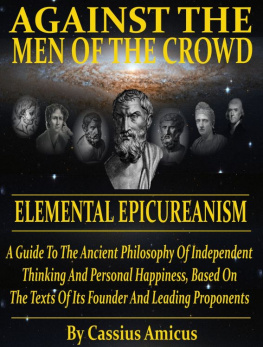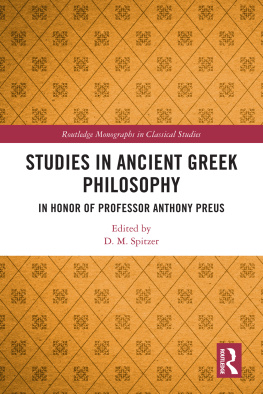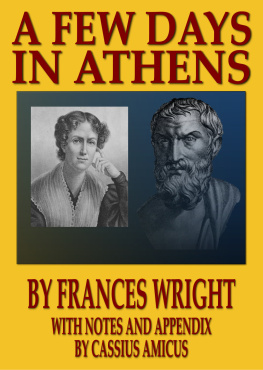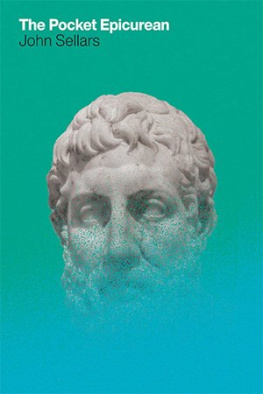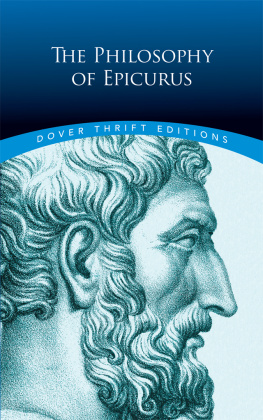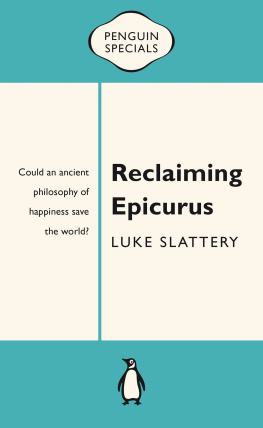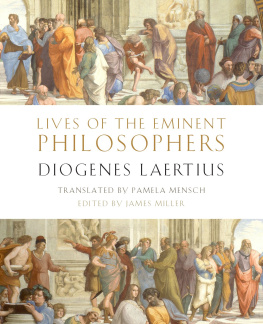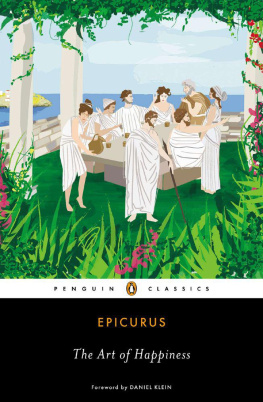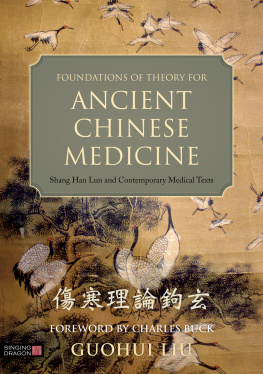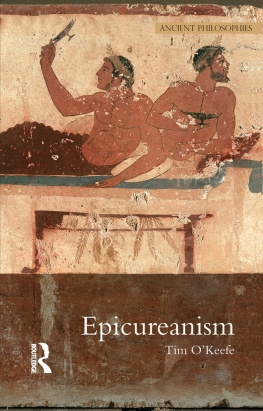Amicus - Elemental Epicureanism
Here you can read online Amicus - Elemental Epicureanism full text of the book (entire story) in english for free. Download pdf and epub, get meaning, cover and reviews about this ebook. genre: Science. Description of the work, (preface) as well as reviews are available. Best literature library LitArk.com created for fans of good reading and offers a wide selection of genres:
Romance novel
Science fiction
Adventure
Detective
Science
History
Home and family
Prose
Art
Politics
Computer
Non-fiction
Religion
Business
Children
Humor
Choose a favorite category and find really read worthwhile books. Enjoy immersion in the world of imagination, feel the emotions of the characters or learn something new for yourself, make an fascinating discovery.
Elemental Epicureanism: summary, description and annotation
We offer to read an annotation, description, summary or preface (depends on what the author of the book "Elemental Epicureanism" wrote himself). If you haven't found the necessary information about the book — write in the comments, we will try to find it.
Elemental Epicureanism — read online for free the complete book (whole text) full work
Below is the text of the book, divided by pages. System saving the place of the last page read, allows you to conveniently read the book "Elemental Epicureanism" online for free, without having to search again every time where you left off. Put a bookmark, and you can go to the page where you finished reading at any time.
Font size:
Interval:
Bookmark:
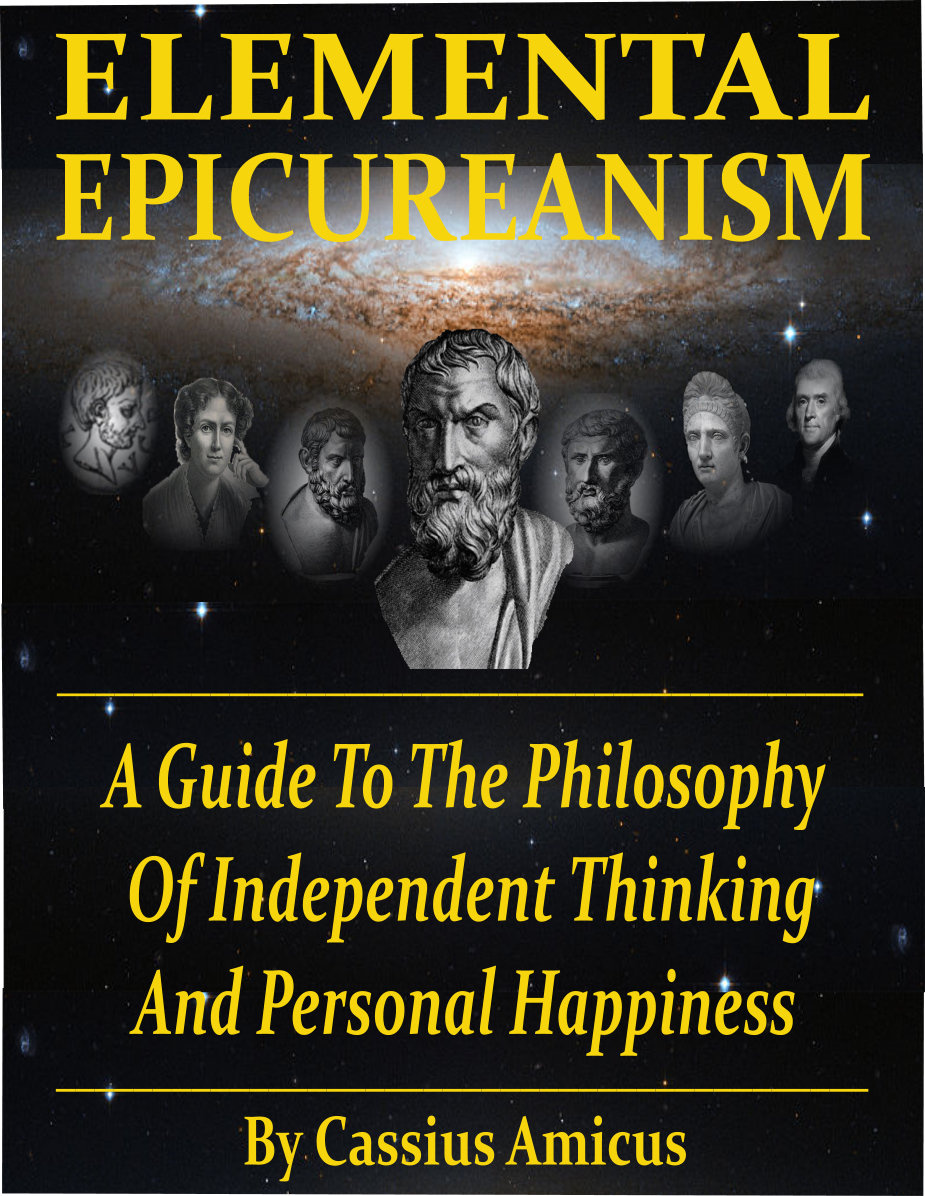

Cassius Amicus
Published by Cassius Amicus.
Copyright 2013 Cassius Amicus
ISBN: 9781301997312
Smashwords Edition 01.01.01
This ebook may be copied, distributed, reposted,reprinted and shared, provided it appears in its entirety withoutalteration, and the reader is not charged to access it.
For more information on the material presented inthis book, see www.NewEpicurean.com.

In investigating nature I would prefer to speakopenly and like an oracle to give answers serviceable to allmankind, even though no one should understand me, rather than toconform to popular opinions and so win the praise freely scatteredby the Men of the Crowd.
Saying XXIX, Vatican Collection of the Sayings OfEpicurus
I was never anxious to please the Men of the Crowd,for what pleased them, I did not know, and what I did know was farremoved from their comprehension.
Epicurus, Letter to an UnknownRecipient


In 1822, a youngwoman from Scotland by the name of Frances Wright published a bookentitled AFew Days In Athens . Bythe time of its publication, Wright had become a friend of theMarquis de Lafayette, and she ultimately traveled in his company toAmerica to visit Thomas Jefferson at Monticello. Jeffersondescribed Wrights book as a " treat to me of the highestorder, " and made manynotes of its content in his personal journals. What Wright hadpresented to Jefferson, and to the world, was a vigorous andenthusiastic defense of the philosophy of Epicurus.
Wright closed her book with Epicurus deliveringthese words:
"Wehave considered the unsound fabric of religion. It remains toconsider that, equally unsound, of morals. The virtue of man isfalse as his faith. What folly invented, knavery supports. Let usarise in our strength, examine, judge, and be free!" The teacherhere paused. The crowd stood, as if yet listening." At aconvenient season , my children, we will examine farther into the nature ofman, and the science of life."
A convenient season has arrived.
This book hasbeen prepared to assist in opening to a new generation of readersthe philosophy of Epicurus, the man renowned in the ancient worldas the Master-Builder of Human Happiness .
Against the Men of the Crowd , the title essay in this collection, presents asummary of the full frontal attack which Epicurus launched on thereligions and the virtues of the leaders of the Men of the Crowd. Ido not represent that any of the text in this essay is a directtranslation of the ancient records. I do not represent that any ofthe ideas in this essay were arranged in the ancient texts in thesame way they are arranged here. What I do represent is that eachof the arguments and ideas presented here existed in substantiallythe same form in the works of Epicurus and his followers twothousand years ago. My goal in preparing this new essay has been tocut through the layers of misrepresentation, misunderstanding, andacademic commentary and to present the ideas of Epicurus to theaverage man or woman of today in way that is at one and the sametime relevant, understandable, and fully consistent with the visionof the ancient Epicureans.
The reader whois familiar with Epicurean literature will readily recognize thesources of the arguments that have been combined to make up Against the Men ofthe Crowd. Beginningwith the theme presented in the opening of Book VI of LucretiusOn the Nature of Things, the essay then turns to the issue of howwe know what it is we claim to know, as developed in other sectionsof Lucretius poem. Many of the details that follow are taken fromthe work known as On Methods of Inference, left to us byPhilodemus of Gadara, and preserved for the modern world only dueto the burial of Herculaneum in the eruption of Pompeii in 79 AD.After those details are presented, the urgency of the issuesinvolved are emphasized with arguments taken from one of the manyEpicurean letters of Seneca. The essay concludes with the summationdelivered by Torquatus in his extensive Defense of Epicurus fromCiceros On Ends.
The next five chapters which follow are myElemental Editions of the several of the most authoritativeEpicurean texts, included here for the first time in book form.These are: (2) Epicurus Letter to Herodotus on general principlesof Nature, (3) Epicurus letter to Pythocles on Astronomy, (4)Epicurus Letter to Menoeceus on Ethics, (5) The Inscription ofDiogenes of Oinoanda, and (6) the Defense of Epicurus deliveredby Torquatus as recorded by Cicero. Like the opening essay, thetexts of these Elemental Editions are not literal translations,but modernized paraphrases tuned to the ear and the style of amodern audience.
With no apology let me emphasize that this book isnot written for academic researchers, or for those whose interestin Epicurus is primarily historical. This book is written for thosewho wish to understand for themselves, so they can apply forthemselves in their own lives, the wisdom of Epicurus.
In the wordswhich Frances Wright gave to Epicurus in 1822, Let us arise in our strength,examine, judge, and be free!
Peace and Safety!
Cassius Amicus, October, 2013
For additionalinformation about Epicureanism, visit NewEpicurean.com , The International Society of Friends ofEpicurus , Epicurus. info or Epicurus.net .

The City of Athens is renowned in history as theplace where men learned a new model of life. It was here that theyfirst lived according to the rule of law, and based their lives onthe philosophies of men such as Socrates, Plato, and Aristotle.
But Athens alsobestowed upon the world another man a man far greater than these - who byhis genius pulled down the walls that other philosophies andreligions had erected, walls which separated men from the pursuitof the happiness to which Nature had called them. The glory of thisman, his philosophy, and his name Epicurus spread far and wide,and even after his death his reputation reached as high as heavenitself.
For Epicurus had seen that Nature had provided allthe things which men really need, and had thereby established humanlife on a sure footing.
But he also saw that even where men were great inriches and honor, and in glory and power, that these things did notcalm their hearts, that constant troubles plagued their lives, andthat men felt constrained to cry out to the gods for relief fromtheir distress.
Seeing this before him, Epicurus perceived that thecause of the trouble was the manner of thinking which unhappy menhad either been taught, or had adopted for themselves. He saw thatthe manner of thinking of a man is the vessel in which he placeshis life, but that this vessel had been corrupted by falseteachings, and that this corruption spoiled all of the good thingswhich Nature had provided.
Epicurus saw that the vessel men had chosen wasleaky and full of holes, so that it could never by any means befilled full, and that it had been befouled with a nauseous flavorthat contaminated everything placed within it.
Next pageFont size:
Interval:
Bookmark:
Similar books «Elemental Epicureanism»
Look at similar books to Elemental Epicureanism. We have selected literature similar in name and meaning in the hope of providing readers with more options to find new, interesting, not yet read works.
Discussion, reviews of the book Elemental Epicureanism and just readers' own opinions. Leave your comments, write what you think about the work, its meaning or the main characters. Specify what exactly you liked and what you didn't like, and why you think so.

